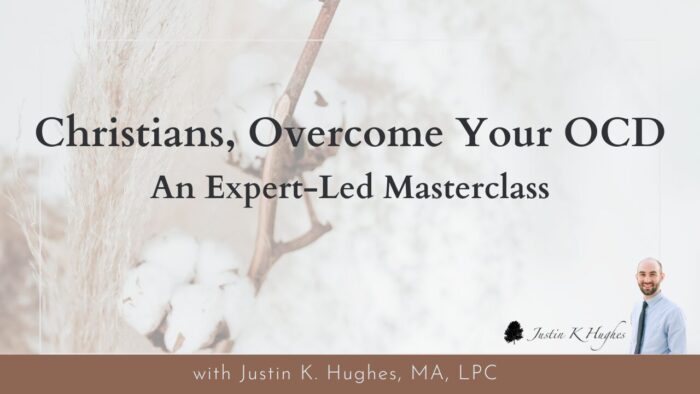
This 3 part series explores a common question for Christians struggling with intrusive, unwanted thoughts: “Can thoughts be evil or sinful? What does that mean?” All good questions are best explored in community; consider this a conversation. I want to encourage you that this is not the same as therapy OR gaining direct wisdom from someone who can guide you in your specific faith community; I highly recommend both, especially if you suffer with OCD or an Anxiety Disorder.
Part 1: The difficulty with uncertainty if you are Christian and suffer from anxiety/OCD. Part 2: Definitions of sin are considered, exploring “How do I know if I’ve sinned?” and how God actually speaks to reveal sin. Part 3: Being Functional- and Faithful.
What is Sin?
There are a variety of ways sin is described in the Bible. Theologically, it can be complex to define, while it is also simple (we don’t have to have the “perfect” definition to acknowledge sin in our lives). Hundreds of different sins are labeled in the Bible. Where the sufferer of OCD and Anxiety Disorders gets caught up is in the uncertainty/doubt they feel. Here are a few examples of different sin “categories”:
- Breaking the law of God (1 John 3:4)
- Rebellion against God (Deuteronomy 9:7) begins as an internal state, especially through pride (Isaiah 14:12-15).
- Original sin involves simply being born into our sinful world just as it is (Psalm 51:5; Romans 5:12)..
- Many more designations are made, with different theological frameworks attempting to describe some of the variations (e.g., Catholicism separates mortal and venial sins, based on 1 John 5:17, or Evangelical theology separating into inherited, imputed, and personal sin– a framework of 3 categories).
Pause
Those not familiar with Scripture or who have been abused by it often already stand in fear of God as an abusive tyrant. This is not the God I know! Nor is it the God of Christianity. He does take sin seriously, but often in ways very different from how our very human brains do. Let’s see God for God as much as we can.
It can be overwhelming reading the hundreds of sins labeled in the Scriptures and those who already have been abused by Scripture feel even more hopeless! To be fair, this “overwhelmed” feeling is not an uncommon dynamic in other domains of life, either. For example, if you moved to a new country and were studying all of their laws, you would also feel overwhelmed. We must slow down to mindfully, calmly look at this topic. Can’t do that right now? Then get some support to be able to do it. Pause reading the article and come back to it later, or discuss it with your team of support.
Christ wishes to bring you hope and freedom (Matthew 11:28-30). Did you know that ‘Fear Not!’ is actually the most common directive in all of the Scriptures? By a long shot. The point of the Gospel is that for those who place their faith in Jesus, there is grace and forgiveness for all sin. Period. Anyone. Anywhere. That’s radical. So let’s stand by the truth without getting distracted.
Check out my full 3-part article for more, Is Anxiety Sin?
Christian Doctrine: Yes, Our Internal Thoughts Matter, But Not How You Might Think They Do
Let’s take a little more specific look Scripturally at how our thinking might be sinful, but we’ll soon follow that up with guidance and hope for what that actually means and a way to approach that if you suffer severely with intrusive thoughts.
Sermon on the Mount- Heart Matters
Jesus made clear in his famous “Sermon on the Mount” that our internal state matters (our “heart”). In Matthew 5:21-22, he goes deeper than cursory and superficial consideration. It might be easy to think, “I don’t have a problem with sin, I haven’t murdered! I didn’t have sex with my coworker’s wife; I haven’t sinned.” He clarifies this later by saying that the problem is what proceeds from the heart (Matthew 15:11). Harboring anger or lust is not to be viewed as inconsequential, despite being internal. In other words, just because I haven’t acted out something doesn’t mean I haven’t sinned.
Temptation and Being Tempted- The Heart of the Matter
James 1:14 teaches us that we are drawn into temptation from a starting point: being “lured and enticed by [our] own desire.” The Greek word translated as “desire” speaks to longing, craving, or lust. Clearly, this reflects something prior to behavior. If we tune into it, it’s not just an immediate reaction like the following:
A (Tempted) = C (Giving In- Internally or Externally)
There’s something in-between:
A (Tempted) → B (Our “Heart”) → C (Giving In)
Christians aren’t to simply look at the end result to determine whether they are walking with Christ. We are to consider the big picture God would have for us.
Jesus was provided “temptation” but didn’t give in to it- either as an internal or external response (Matthew 4:1-11). The technical existence of temptation is not problematic for the believer; it’s our response to it. You can see a video clip that features violence. You can drive past the strip club. But we are tempted when our own “sinful desires” give that temptation any footing. We can’t avoid all possibility of temptation, not should we. Jesus tells us we are to be in the world (John17:14-15).
All Apart From Faith Is Sin- Faith Matters
Possibly one of the toughest passages to read if you suffer with anxiety and especially perfectionism is Romans 14:23b:
“For whatever does not proceed from faith is sin.”
Living in Minnesota, we would say, “uffda.” Oh boy That’s rough. But again, context is king. The whole passage is about learning to be faithful to God while being understanding towards differences in conscience- even giving ourselves a break when our conscience is more sensitive than other believers- work with where you/others are at. That’s right- conscience can be acceptably different for different people! That’s good to know for my anxious and perfectionistic self!
Bad News / Good News- What’s the Matter?
The prophet Jeremiah was given a glimpse into the human heart, and it’s bad news/good news:
The heart is deceitful above all things,
and desperately sick;
who can understand it?
“I the Lord search the heart
and test the mind,
to give every man according to his ways,
according to the fruit of his deeds.” (Jeremiah 17:9-10)
The bad news is I have a deceitful heart. Sick. It needs healing. I need to be saved from it. The good news is that God graciously heals and saves. Amen!
What Scripture Doesn’t Say- Thoughts Don’t Matter Like We May Always Think They Do
There are no Scriptures I am aware of nor consistent, major teachings of the church that say the occurrence of a thought, feeling, or any internal impulse is necessarily sinful. This is where uncertainty comes to play. There is a required level of certainty we all must face. Not sure about that? Check out my full 4-part series, Can Christians Be Free From Uncertainty?
I believe and will argue that any thought can exist in your mind. And we can practice facing that thought by exposure, as I’ve noted in my Biblical Rationale For Exposure Therapy, because if you can’t “think” about something reprehensible, you can’t even confess known sin. God is not asking us to suppress thoughts or not be aware or not let our brains not process information. It’s what we do with it that makes all the difference. And interestingly enough, this is also the heart of OCD treatment: you are not defined by your intrusive obsessions- but you get to choose how to respond over time to them. Isn’t this learning the discipline of faithfulness?
How Do I Know If I’ve Sinned?
Many clients can grasp the rationale that the occurrence of a thought is not necessarily a problem. For example, they understand how if someone says a word, like potato, sex, apple, kill, beautiful, hatred, that we now have a “thought” about what is spoken. Typically, clients feel and/or believe that if the thought is generated internally it’s somehow more real. Evan experienced this, saying, “I know, Justin, that I’m technically thinking a thought when we say it out loud, but isn’t it different when these thoughts are constantly generating inside of myself? Isn’t that a heart issue? A faith issue?”
The Holy Spirit is considered our “Helper.” One of the ways He helps is through conviction of sin (John 16:8). Notice, very carefully, here: it is God who convicts. In fact, in even stronger wording, Jesus in John 6:44 says that we can’t even come to the Father without him drawing us!
To even identify sin, from a Biblical, Christian perspective, we must actually rely (trust, faith) on the object of our faith to even do this. Sin is an often odd concept to those who aren’t of faith- and it should be!
You must trust in God to reveal sin. And if you trust in God, you will also trust the many ways he says he speaks (see my whole article on the topic: “The Holy Spirit is Different Than Your Emotions or Thoughts- Part 2 of 2: How Does God Speak?).
17 Ways God Speaks
17 ways?!! That’s a lot! Yes, and it’s only a quick list of what I- as one person- have been able to compile. I am confident there are more.
- Prayer (Romans 8:26-27)
- Peace specifically after prayer, which comes from God, not ourselves (Philippians 4:6-7)
- Through His Word (1 Timothy 3:16)
- Through the person of Jesus (Hebrews 1:1-2)
- Nature (Romans 1:20)
- Other Believers (James 3:17)
- Music (2 Chronicles 20:21)
- Circumstances (2 Corinthians 12:6-7)
- His Spirit (John 14:17; 1 Corinthians 3:16)
- Not through fear– for followers of Him (1 John 4:18), see the article “Fear Not”
- A mature conscience (1 Timothy 1:5; 1 Peter 3:16)
- Trials, suffering, and events (James 1:2-5; Hebrews 5:12-11; 1 Peter 1:6-7)
- God’s kindness– a motivator for admitting our wrongs (Romans 2:4)
- Through testing and spiritual growth (Romans 12:1-2)
- Audibly, directly, on very special occasions (see Exodus 3 as one example). Many people just assume- incorrectly- that the Bible is just full of stories of God just talking to everyone. Not true. Special circumstances led to God making Himself known audibly and/or in some overtly tangible way. He may do that still today, but requiring it is setting up an unrealistic expectation- or worse, telling God what to do.
-
- By conviction of the Holy Spirit (John 16:8).
- Through discipline, not punishment for believers (Hebrews 12:4-13).
- Being made in the image of God, our own awareness (Psalm 19:1-4; Matthew 5:45; Romans 1:20).
As Jeremiah faithfully penned, it is the Lord who searches the heart.
In the 3rd part of this series, we’ll close it out with guidance on being faithful- and functional.








Hi Justin,
My name is Giselle and I struggle with OCD and anxiety. This one time, I was thinking about this boy I like and how I messed things up because of my OCD and intrusive thoughts. So I got angry and then Matthew 12:29 came to mind randomly. My mind took that and ran with it. I think I had an idea/thought to think what the Pharisees were saying to “get back at God” because of my OCD and I was angry. The reason why I said “I think” is because I don’t really remember what I was thinking. My mind is remembering different things. I don’t know if my mind was just being random or if it was a what if thought. Or if it was to “get back at God“. I just stood there stuck in my mind thinking. But then I snapped out of it and I got anxious and scared. My mind had the urge to think Matthew 12:29 but I didn’t want to. I was fighting my mind from thinking it. It was awful and I was scared. This is my fault. I feel like a horrible person and I hate what I have done. Help me.
Giselle, so sorry you’re struggling. There is much here that would really need someone versed in OCD/Anxiety and faith to best walk with you. Know that there is hope even when feeling awful and scared!